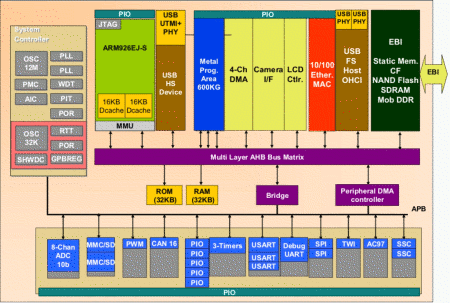Low-cost, customizable processor runs Linux
Jun 26, 2007 — by LinuxDevices Staff — from the LinuxDevices Archive — 3 viewsAtmel has launched an interesting new chip line aimed at reducing NRE (non-recurring engineering) expenses associated with ASIC (application-specific integrated circuit) development. The CAP (“customizable Atmel processor”) integrates a Linux-friendly ARM9 core together with a metal-programmable function block where users can implement cores, DSPs (digital signal processors), or custom peripherals.
Atmel says that compared to RISC/DSP chips, its CAP devices cost less and offer greater customizability. Compared to two-chip designs with externel SRAM-based FPGAs (field-programmable gate arrays), they are said to perform much better and dissipate much less power, while better protecting IP (intellectual property). Finally, compared to traditional ASICs, CAP chips offer NRE costs starting at $150,000, compared to $300,000 to $1 million for conventional standard-cell or gate array ASIC designs, depending on geometry and IP content.
The first CAP chip became available late last month. The AT91CAP9S is based on an ARM926EJ-S processor clocked at 200MHz, along with 250K or 500K metal programmable gates. The programmable block can be used to add an additional ARM9 or AVR32 processor core, DSP core, or custom peripherals not available on off-the-shelf SoCs (system-on-chip processors). A 6-layer AHB bus and distributed DMA architecture is said to provide lots of on-chip bandwidth, suitable for deeply embedded networked applications.

Atmel AT91CAP9S chip architecture
(Click to enlarge)
AT91CAP9S peripherals include a full-speed USB host port, high-speed USB device port, 10/100 Ethernet MAC, image sensor interface, 2.0A and 2.0B CAN controller, LCD controller, MCI, SSC, PWM, LCD and AC97 controllers, SPI master and slave, two USARTs, three 16-bit timer counters, an 8-channel, 10-bit analog to digital converter, and various supervisory functions, Atmel said. Optional hardware AES/TDES encryption/decryption engines are also available.
According to Atmel, users migrating existing designs based on external FPGAs can simply supply Atmel with their RTL netlist. Atmel keeps supplies of the AT91CAP9 chip on hand, and can deliver prototypes in 10 weeks and production quantities in 16 weeks, it said.
Alternatively, users interested in developing custom IP can use an available AT91CAP9-DK development board, which combines a fixed ARM9-based SoC with a “tightly coupled” high-density FPGA that emulates the CAP9's metal-programmable block. The board is said to enable parallel hardware/software testing at “close to operational speed.”
Availability
CAP NRE starts at $150,000, with additional charges applicable for some available off-the-shelf IP. At volumes above 100,000, the CAP9 parts cost $13. The AT91CAP9S products and development board are immediately available.
This article was originally published on LinuxDevices.com and has been donated to the open source community by QuinStreet Inc. Please visit LinuxToday.com for up-to-date news and articles about Linux and open source.